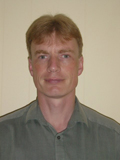|
|
|
<<< Previous speaker
|
next speaker >>>
|
David Holmes, Sun Microsystems

David Holmes is a Software Engineer at Sun Microsystems, working in the VM Real-Time group on the Java Real-time System product. Located in Brisbane, Australia, David's previous work with Java technology focused on concurrency and synchronization support in the language and virtual machine and his prior project involved developing a real-time virtual machine that supported version 1.0 of the Realtime Specification for Java (RTSJ). David was a member of the JCP Expert Group for JSR-166 (Concurrency Utilities), that shipped in the Java 5 release, is a current member of the expert group for JSR-282 (RTSJ 1.1) and is on the Technical Interpretation Committee for the RTSJ. He has presented tutorials on concurrent Java programming and design at numerous international object-oriented programming conferences over the past nine years, and more recently tutorials on Real-time Java programming.
Along with Ken Arnold and James Gosling, he is a co-author of the book "The Java Programming Language" - Third and Fourth Editions. He was also a contributing author to "Java Concurrency in Practice", by Brian Goetz et al. David completed his Ph.D. at Macquarie University, Sydney, in 1999, in the area of synchronization within object-oriented systems.
|
Presentation: "Introduction to Real-time Programming on the Java Platform"
Time:
Thursday 15:30 - 16:15
Location:
Ballroom Le Grand 2
Abstract: A real-time system is a system in which the time at which a result is produced is as important as the logical correctness of the result. Real-time programming and Java are not normally synonymous. Real-time is often associated with specialized application domains such as avionics, process control and communication systems. Since the advent of the Real-time Specification for Java (RTSJ) in 2000, the Java platform has extended its reach into these specialized domains. Meanwhile mainstream Java application domains, such as banking and finance, have been pushing the limits on traditional Java platform technology - seeking predictability rather than simply raw performance.
This talk explores what real-time means and then briefly covers the different functional areas of the RTSJ programming model, showing how predictability can be achieved by controlling, or by-passing, those features of a non-real-time system that invariably lead to unpredictable execution.
Presentation: "Languages Panel"
Time:
Thursday 16:30 - 17:15
Location:
Ballroom Le Grand 2
|
 |
| |
 David Holmes is a Software Engineer at Sun Microsystems, working in the VM Real-Time group on the Java Real-time System product. Located in Brisbane, Australia, David's previous work with Java technology focused on concurrency and synchronization support in the language and virtual machine and his prior project involved developing a real-time virtual machine that supported version 1.0 of the Realtime Specification for Java (RTSJ). David was a member of the JCP Expert Group for JSR-166 (Concurrency Utilities), that shipped in the Java 5 release, is a current member of the expert group for JSR-282 (RTSJ 1.1) and is on the Technical Interpretation Committee for the RTSJ. He has presented tutorials on concurrent Java programming and design at numerous international object-oriented programming conferences over the past nine years, and more recently tutorials on Real-time Java programming.
Along with Ken Arnold and James Gosling, he is a co-author of the book "The Java Programming Language" - Third and Fourth Editions. He was also a contributing author to "Java Concurrency in Practice", by Brian Goetz et al. David completed his Ph.D. at Macquarie University, Sydney, in 1999, in the area of synchronization within object-oriented systems.
David Holmes is a Software Engineer at Sun Microsystems, working in the VM Real-Time group on the Java Real-time System product. Located in Brisbane, Australia, David's previous work with Java technology focused on concurrency and synchronization support in the language and virtual machine and his prior project involved developing a real-time virtual machine that supported version 1.0 of the Realtime Specification for Java (RTSJ). David was a member of the JCP Expert Group for JSR-166 (Concurrency Utilities), that shipped in the Java 5 release, is a current member of the expert group for JSR-282 (RTSJ 1.1) and is on the Technical Interpretation Committee for the RTSJ. He has presented tutorials on concurrent Java programming and design at numerous international object-oriented programming conferences over the past nine years, and more recently tutorials on Real-time Java programming.
Along with Ken Arnold and James Gosling, he is a co-author of the book "The Java Programming Language" - Third and Fourth Editions. He was also a contributing author to "Java Concurrency in Practice", by Brian Goetz et al. David completed his Ph.D. at Macquarie University, Sydney, in 1999, in the area of synchronization within object-oriented systems.

